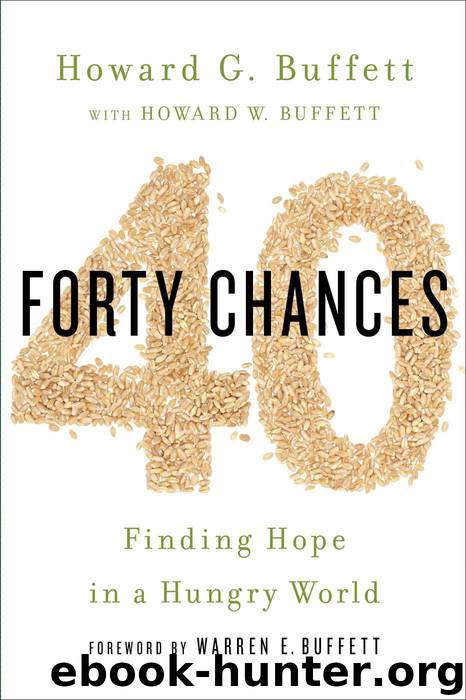40 Chances: Finding Hope in a Hungry World by Howard G Buffett

Author:Howard G Buffett
Language: eng
Format: mobi
Publisher: Simon & Schuster
Published: 2013-10-21T18:30:00+00:00
FOOD AID BECOMES A BUSINESSMAN’S MORNING CROISSANT
It concerns me that NGOs know the negative impact of monetization in the communities they serve, and yet a number of them continue to use monetization. Put simply, it is about self-preservation. According to the GAO, nongovernmental organizations traded 1.3 million tons of US-grown food for cash in thirty-four countries from 2008 to 2010. I should point out that the CARE official I spoke to in Mozambique in 2006 was not proud of the organization’s history of monetizing commodities. But one of the reasons I mention CARE by name is that it was already in the process of adopting the brave and principled position not to use the monetization process any longer.
To understand the sacrifice that CARE made, you need to realize that it had the closest ties to the US government of any NGO. The charity was formed by Americans at the end of World War II to send to survivors in Europe packages of food recovered from army surplus. Washington’s support of CARE grew as the group expanded its work to fighting poverty in eighty-four countries.
By 2006, CARE was generating $45 million annually from monetizing US commodities. That money was paying for poverty-fighting programs that formed the nucleus of many of CARE’s country offices, several of which depended on monetizing US food aid for half their budget. The money paid for about twenty development programs in Africa, which did everything from teaching farmers how to make more money by growing alternative crops, such as sunflowers, to teaching them about soil conservation and agroforestry.
But here’s what happened: CARE’s leadership developed the position that it needed to get poor people more involved in making decisions about programs that are intended to help them. A central tenet of this “rights-based” philosophy is that CARE officials should consider whether their poverty-fighting programs have unintended consequences. Monetizing US commodities became a moral issue because they realized it was harming farmers in places where CARE was acting as a grain trader. What’s more, CARE officials realized that the basic proposition that food aid from America was supposed to be consumed by poor people was being distorted; when monetized, it was ending up in the hands of middle-class and upper-class consumers in developing countries. For instance, in Uganda, some US food aid ended up at a bakery across the street from the US embassy. In Ethiopia, some cooking oil monetized by CARE ended up at a Sheraton hotel in Addis Ababa.
Daniel Maxwell, a senior CARE official based in Nairobi, told us that the revenues raised through monetization had been important to the organization, but he and others became increasingly uncomfortable with it. Dan’s concerns about monetization grew as he worked on a book, Food Aid After Fifty Years: Recasting Its Role, with a friend from graduate school, Cornell University economist Christopher Barrett. They concluded that the primary objective of food aid had devolved to where it was less about helping food-insecure people than it was “heavily oriented toward domestic concerns in donor countries.
Download
This site does not store any files on its server. We only index and link to content provided by other sites. Please contact the content providers to delete copyright contents if any and email us, we'll remove relevant links or contents immediately.
Hit Refresh by Satya Nadella(9115)
When Breath Becomes Air by Paul Kalanithi(8415)
The Girl Without a Voice by Casey Watson(7877)
A Court of Wings and Ruin by Sarah J. Maas(7800)
Do No Harm Stories of Life, Death and Brain Surgery by Henry Marsh(6929)
Shoe Dog by Phil Knight(5252)
The Rules Do Not Apply by Ariel Levy(4946)
A Higher Loyalty: Truth, Lies, and Leadership by James Comey(4942)
Hunger by Roxane Gay(4919)
Tuesdays with Morrie by Mitch Albom(4762)
Everything Happens for a Reason by Kate Bowler(4726)
The Immortal Life of Henrietta Lacks by Rebecca Skloot(4570)
Millionaire: The Philanderer, Gambler, and Duelist Who Invented Modern Finance by Janet Gleeson(4456)
How to Change Your Mind by Michael Pollan(4343)
All Creatures Great and Small by James Herriot(4301)
The Money Culture by Michael Lewis(4182)
Man and His Symbols by Carl Gustav Jung(4118)
Elon Musk by Ashlee Vance(4115)
Tokyo Vice: An American Reporter on the Police Beat in Japan by Jake Adelstein(3971)
